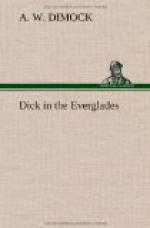“I’d rather do anything than go back,” replied Dick. “Let’s paddle round the edge of this pond and see where the bushes are thinnest.”
They paddled along the shore of the little lake, finding the water so shallow that it barely floated the canoe, until just where the bushes seemed thickest it deepened to several feet, and parting the bushes disclosed a deep but very narrow creek through which the water slowly flowed. There was no room to paddle and for more than a mile the boys dragged the canoe by taking hold of overhanging branches. Sometimes they could lift branches that crossed the creek over the canoe as they passed. Sometimes they had to lie down in the canoe to get under the obstructions and often they had to stop to cut away limbs of small trees. They were finally stopped by the trunk of a large tree which had fallen across and completely blocked up the creek. Just beyond it two palmettos had fallen in the stream, one of which lay lengthwise in the channel. It would have taken days to remove the obstructions and the young explorers explored the swamp near them to find a possible carry. They found that a hundred feet behind them the woods were thinner and they could cut a path through which they could carry the canoe and stores.
“This is going to take all the rest of the day,” said Ned, “and it will be a dry camp after a heap of hot work. What do you say to leaving this till to-morrow, and putting in this afternoon hunting for the best route and looking for fresh water?”
“That’s me,” replied Dick. “Let’s hike in a hurry. Only don’t you lose your way. We have got to get back to the canoe and you’re the guide.”
“Don’t you worry about that. You may have to go slow, but I won’t lose myself and I will bring you back to the canoe,” said Ned.
Instead of following the creek, Ned bore off to the north where the woods seemed more open and soon reached a stretch of dry, open prairie. On the border of it stood a tall mastic tree with a lightning-blasted top and many branches which made it easy to climb. Ned was soon in the top of the tree making a mental map of the country round about.
“It is all right now,” said he as he climbed down. “I can see the open Everglades within four or five miles, and there is something that looks like a slough that is only half as far away. We’ll leave the creek in the morning and cut our path this way, instead of around those trees. It won’t be as much work, either. We can do some of that work to-night and camp right here. Then in the morning, at daylight, we will start out with the canoe on our shoulders and tramp till we find water to float it.”
“But how about water to drink? I need it worse than the canoe.”
“Where there’s water for the canoe, there will be water for you. It’s Everglade water from now on.”
“I wish it would begin this minute. There’s a little mud-hole that looks pretty wet. Do you think that might be fresh?”




